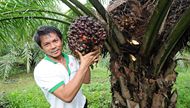Sustainable production of palm oil for bioenergy

Farmed feedstocks for industrial processes are becoming ever more important as energy sources, for fuel blending and in the consumer goods industry. Vegetable oil is regarded as a climate-friendly, renewable energy resource, the cultivation and production of which opens up new income-generating opportunities in many countries.
Farmed feedstocks for industrial processes are becoming ever more important as energy sources, for fuel blending and in the consumer goods industry. Vegetable oil is regarded as a climate-friendly, renewable energy resource, the cultivation and production of which opens up new income-generating opportunities in many countries. Thailand is one of the countries that are responding by stepping up cultivation of oil palms. But the expansion of production areas is attracting growing criticism. Rainforests are frequently felled to make way for palm oil production, endangering rare species and causing various other impacts. On many plantations working conditions are poor and pay is low. In addition, food prices rise as more and more palm oil is used for energy purposes.
Developing sustainability standards
To combat destructive logging worldwide and ensure that the generation of energy from palm oil has no adverse impacts, standards for sustainable palm oil production have been under development for several years now. One such initiative is the certification system of the Roundtable on Sustainable Palm Oil (RSPO), a sustainability standard defined jointly by producers, industry, business, non-governmental organisations and banks. The Thai government has also developed schemes of its own that complement the RSPO standard.
A project of the International Climate Initiative (ICI) implemented by the Deutsche Gesellschaft für Internationale Zusammenarbeit (GIZ) GmbH is helping Thailand to introduce sustainability standards for palm oil, to make production sustainable and to certify it. In providing this assistance it takes particular account of the specific national circumstances: 80 per cent of Thai palm oil production is in the hands of small farmers, who grow not only oil palms but also rubber and some food crops. The situation in Thailand is thus quite different from that in countries such as Indonesia and Malaysia, where farming is dominated by large-scale monocultures. Also, in Thailand the rainforests are no longer being cleared for agriculture; its remaining forests are protected effectively.
Improving and monitoring cultivation methods
The project aims to increase acceptance of sustainable palm oil production among producers. The project has agreed with farmers to increase their yields thus giving them a higher income, part of which they then use to meet the higher costs of sustainable production. The project helps small farmers improve their production methods. Training sessions and regular plantation tours are used to share knowledge about good plantation management, appropriate fertiliser and pesticide use, best harvesting practices and ideal harvesting times.
The project promotes cooperation with mills and intermediate dealers in order to increase the oil yield from the fruit. This too has a direct impact on farmers’ incomes. Farmers also receive training in matters such as first aid, precautions for pesticide use, and workplace ergonomics. In addition, processing in the palm oil mills is being made more sustainable: biogas units capture the methane released and use it to generate energy.
Results and upscaling
The use of sustainable production methods creates additional market opportunities for the small farmers. The project increases the competitiveness of Thai producers, enabling them to meet the rising demand for sustainably produced palm oil. This benefits the country’s wider economy and labour market.
At national level the project fosters dialogue among the various policy-making and private-sector stakeholders in the palm oil sector and advises the Thai government on the promotion of sustainable palm oil production. With the private sector it is establishing and institutionalising an RSPO sustainability standard adapted to the Thai context.
The first sustainably produced palm oil from independent small farmers anywhere in the world will be on the market early in 2012. The project is thus setting a milestone in sustainable palm oil production. The model that has been developed can be transferred to neighbouring countries.
The link has been copied to the clipboard
Contact
IKI Office
Zukunft – Umwelt – Gesellschaft (ZUG) gGmbH
Stresemannstraße 69-71
10963 Berlin
Related Videos
Related Publications
-
 05/ 2022 | IKI Evaluation
05/ 2022 | IKI EvaluationSustainable Palm Oil Production for Bioenergy
German with English executive summary (PDF, 1 MB, barrier-free)






